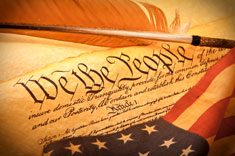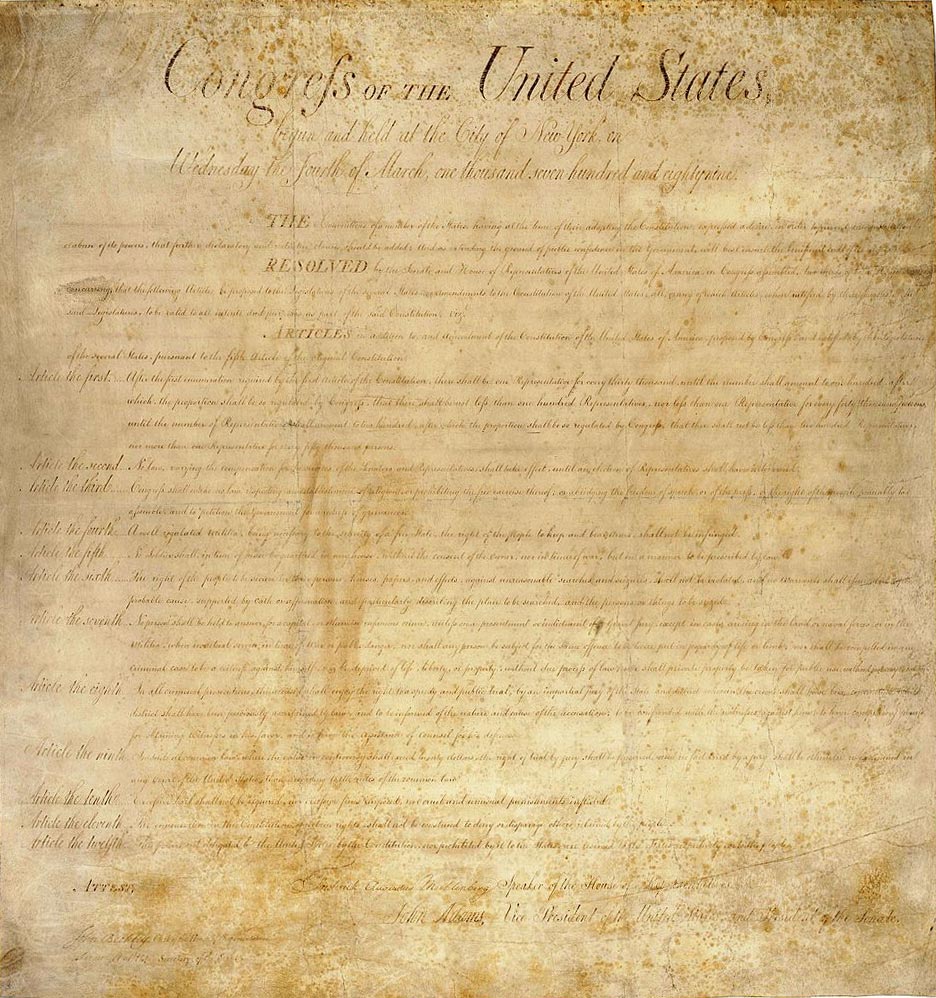| United States Constitution | |
|---|---|
 |
|
| The U.S. Constitution | |
| Preamble | |
| Articles of the Constitution | |
| I ‣ II ‣ III ‣ IV ‣ V ‣ VI ‣ VII | |
| Amendments to the Constitution | |
| Bill of Rights | |
| I ‣ II ‣ III ‣ IV ‣ V ‣ VI ‣ VII ‣ VIII ‣ IX ‣ X | |
| Additional Amendments | |
| XI ‣ XII ‣ XIII ‣ XIV ‣ XV ‣ XVI ‣ XVII ‣ XVIII ‣ XIX ‣ XX ‣ XXI ‣ XXII ‣ XXIII ‣ XXIV ‣ XXV ‣ XXVI ‣ XXVII | |
| View the Full Text | |
| Original Constitution | |
| Bill of Rights | |
| Additional Amendments |
The 4th Amendment aims at protecting Americans from irrational seizures and searches. A search is any government intrusion into something in which somebody has a rational expectation of privacy. A seizure on the other hand, takes place when the government detains a person or takes possession of items.
The Fourth Amendment also requires any warrant to be sustained by probable cause and be judicially authorized. A probable cause is the grounds by which a law agent or officer has the basis to obtain a warrant for arrest, conduct a search, or make an arrest when considering criminal charges. The amendment was espoused in reply to the misuse of the writ assistance (a form of general warrant in the American-Revolution).
Text
The right of the people to be secure in their persons, houses, papers, and effects, against unreasonable searches and seizures, shall not be violated, and no Warrants shall issue, but upon probable cause, supported by Oath or affirmation, and particularly describing the place to be searched, and the persons or things to be seized.
Purpose
 The British government used to grant general search powers to British law enforcements, enabling them to conduct searches in any home they wanted, at any time with or without a reason. The Founding Fathers did not like this concept. The 4th amendment was included into the Bill-of-Rights, so as to uphold the security and privacy of individuals against prejudiced raid by the government and its officials.
The British government used to grant general search powers to British law enforcements, enabling them to conduct searches in any home they wanted, at any time with or without a reason. The Founding Fathers did not like this concept. The 4th amendment was included into the Bill-of-Rights, so as to uphold the security and privacy of individuals against prejudiced raid by the government and its officials.
Applicability
According to this amendment any warrant should be judicially sanctioned for an arrest or a search. For the warrant to be regarded as reasonable, it should have a probable cause supporting it in addition to it being restricted in capacity, according to precise information provided by a law-enforcement-officer who has affirmed by it.
The amendment applies to searches and seizures by the government, but not to those conducted by private organizations or citizens. Initially, the Bill-of-Rights restricted the Federal Government only, but as from 1961 the Supreme Court decreed that the 4th amendment was applicable to the States through the Due-Process-Clause of the 14th Amendment.
Searches Without Warrants
Over the years, the Supreme Court realized that there are some circumstances and environments that would require an exception to the probable cause requirement. These scenarios are referred to as “special need exceptions” that allow searches without warrants.
Usually a search without warrant is conducted in a circumstance where a law-enforcement-officer personally witnesses a person committing a misdemeanor, or when the officer has a rational cause to consider that the suspect has committed a documented felony. Another exception scenario is when a person allows a search to be conducted, regardless of whether he or she is unaware of his or her right to refuse to cooperate. Open fields such as woods and pastures are also not covered by the 4th Amendment, provided that a search done therein would not have any logical expectation of privacy. Moreover, searches conducted at the U.S. border or in an international airport can be conducted with no probable cause or warrant, subject to the border-search exception.
Exclusionary Rule
One of the major ways that courts enforce the 4th Amendment is through the use of the exclusionary rule. This law provides that evidences acquired by violating the 4th amendment are not acceptable by the prosecution during a criminal trial. The Court adopted this rule in 1914, in the Weeks vs. United States case, prior to which any evidence regardless of how it was obtained was admissible in court.
Primarily, the exclusionary rule serves to prevent police officers from deliberately violating a suspect’s 4th Amendment rights. The underlying principle in the exclusionary rule is that the police would not violate the 4th amendment, if they know that evidence acquired through violation of this amendment is not usable when convicting someone of a crime.
4th Amendment in Modern America
Since society criticizes crime while still valuing liberty, there will always a pressure between the privacy of individuals and the interests of law enforcement. Modern society has made it easier for criminals to hide crime, making it difficult for law enforcement to keep up. This sometimes has necessitated the use of investigative techniques that trample on 4th Amendment rights and privacy expectations of innocent citizens.
As the U.S. and state governments continued to grow in the 20th century, the amount of information that the governments collect also increased. When the government collects information for administrative purposes such as tax collection and issuing licenses, the government does not have to gratify the 4th Amendment. Unfortunately, this information is sometimes used by investigators, misused by rogue government employees or released by government agencies. This in turn violates the fourth amendment rights of citizens as well as their expectations of privacy.